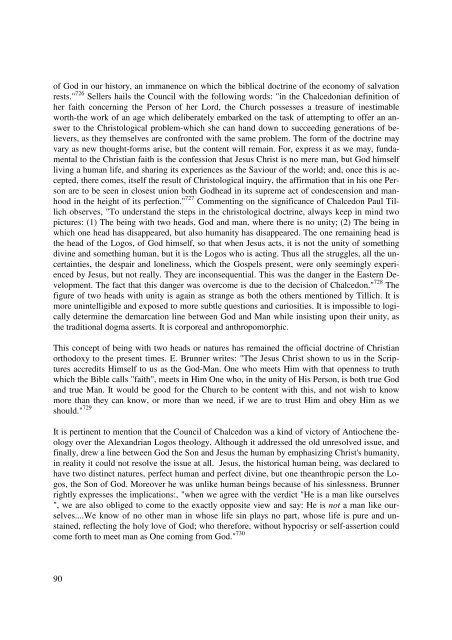Scripture and God in Christianity
Scripture and God in Christianity
Scripture and God in Christianity
You also want an ePaper? Increase the reach of your titles
YUMPU automatically turns print PDFs into web optimized ePapers that Google loves.
of <strong>God</strong> <strong>in</strong> our history, an immanence on which the biblical doctr<strong>in</strong>e of the economy of salvation<br />
rests." 726 Sellers hails the Council with the follow<strong>in</strong>g words: "<strong>in</strong> the Chalcedonian def<strong>in</strong>ition of<br />
her faith concern<strong>in</strong>g the Person of her Lord, the Church possesses a treasure of <strong>in</strong>estimable<br />
worth-the work of an age which deliberately embarked on the task of attempt<strong>in</strong>g to offer an answer<br />
to the Christological problem-which she can h<strong>and</strong> down to succeed<strong>in</strong>g generations of believers,<br />
as they themselves are confronted with the same problem. The form of the doctr<strong>in</strong>e may<br />
vary as new thought-forms arise, but the content will rema<strong>in</strong>. For, express it as we may, fundamental<br />
to the Christian faith is the confession that Jesus Christ is no mere man, but <strong>God</strong> himself<br />
liv<strong>in</strong>g a human life, <strong>and</strong> shar<strong>in</strong>g its experiences as the Saviour of the world; <strong>and</strong>, once this is accepted,<br />
there comes, itself the result of Christological <strong>in</strong>quiry, the affirmation that <strong>in</strong> his one Person<br />
are to be seen <strong>in</strong> closest union both <strong>God</strong>head <strong>in</strong> its supreme act of condescension <strong>and</strong> manhood<br />
<strong>in</strong> the height of its perfection." 727 Comment<strong>in</strong>g on the significance of Chalcedon Paul Tillich<br />
observes, "To underst<strong>and</strong> the steps <strong>in</strong> the christological doctr<strong>in</strong>e, always keep <strong>in</strong> m<strong>in</strong>d two<br />
pictures: (1) The be<strong>in</strong>g with two heads, <strong>God</strong> <strong>and</strong> man, where there is no unity; (2) The be<strong>in</strong>g <strong>in</strong><br />
which one head has disappeared, but also humanity has disappeared. The one rema<strong>in</strong><strong>in</strong>g head is<br />
the head of the Logos, of <strong>God</strong> himself, so that when Jesus acts, it is not the unity of someth<strong>in</strong>g<br />
div<strong>in</strong>e <strong>and</strong> someth<strong>in</strong>g human, but it is the Logos who is act<strong>in</strong>g. Thus all the struggles, all the uncerta<strong>in</strong>ties,<br />
the despair <strong>and</strong> lonel<strong>in</strong>ess, which the Gospels present, were only seem<strong>in</strong>gly experienced<br />
by Jesus, but not really. They are <strong>in</strong>consequential. This was the danger <strong>in</strong> the Eastern Development.<br />
The fact that this danger was overcome is due to the decision of Chalcedon." 728 The<br />
figure of two heads with unity is aga<strong>in</strong> as strange as both the others mentioned by Tillich. It is<br />
more un<strong>in</strong>telligible <strong>and</strong> exposed to more subtle questions <strong>and</strong> curiosities. It is impossible to logically<br />
determ<strong>in</strong>e the demarcation l<strong>in</strong>e between <strong>God</strong> <strong>and</strong> Man while <strong>in</strong>sist<strong>in</strong>g upon their unity, as<br />
the traditional dogma asserts. It is corporeal <strong>and</strong> anthropomorphic.<br />
This concept of be<strong>in</strong>g with two heads or natures has rema<strong>in</strong>ed the official doctr<strong>in</strong>e of Christian<br />
orthodoxy to the present times. E. Brunner writes: "The Jesus Christ shown to us <strong>in</strong> the <strong>Scripture</strong>s<br />
accredits Himself to us as the <strong>God</strong>-Man. One who meets Him with that openness to truth<br />
which the Bible calls "faith", meets <strong>in</strong> Him One who, <strong>in</strong> the unity of His Person, is both true <strong>God</strong><br />
<strong>and</strong> true Man. It would be good for the Church to be content with this, <strong>and</strong> not wish to know<br />
more than they can know, or more than we need, if we are to trust Him <strong>and</strong> obey Him as we<br />
should." 729<br />
It is pert<strong>in</strong>ent to mention that the Council of Chalcedon was a k<strong>in</strong>d of victory of Antiochene theology<br />
over the Alex<strong>and</strong>rian Logos theology. Although it addressed the old unresolved issue, <strong>and</strong><br />
f<strong>in</strong>ally, drew a l<strong>in</strong>e between <strong>God</strong> the Son <strong>and</strong> Jesus the human by emphasiz<strong>in</strong>g Christ's humanity,<br />
<strong>in</strong> reality it could not resolve the issue at all. Jesus, the historical human be<strong>in</strong>g, was declared to<br />
have two dist<strong>in</strong>ct natures, perfect human <strong>and</strong> perfect div<strong>in</strong>e, but one theanthropic person the Logos,<br />
the Son of <strong>God</strong>. Moreover he was unlike human be<strong>in</strong>gs because of his s<strong>in</strong>lessness. Brunner<br />
rightly expresses the implications:, "when we agree with the verdict "He is a man like ourselves<br />
", we are also obliged to come to the exactly opposite view <strong>and</strong> say: He is not a man like ourselves....We<br />
know of no other man <strong>in</strong> whose life s<strong>in</strong> plays no part, whose life is pure <strong>and</strong> unsta<strong>in</strong>ed,<br />
reflect<strong>in</strong>g the holy love of <strong>God</strong>; who therefore, without hypocrisy or self-assertion could<br />
come forth to meet man as One com<strong>in</strong>g from <strong>God</strong>." 730<br />
90
















